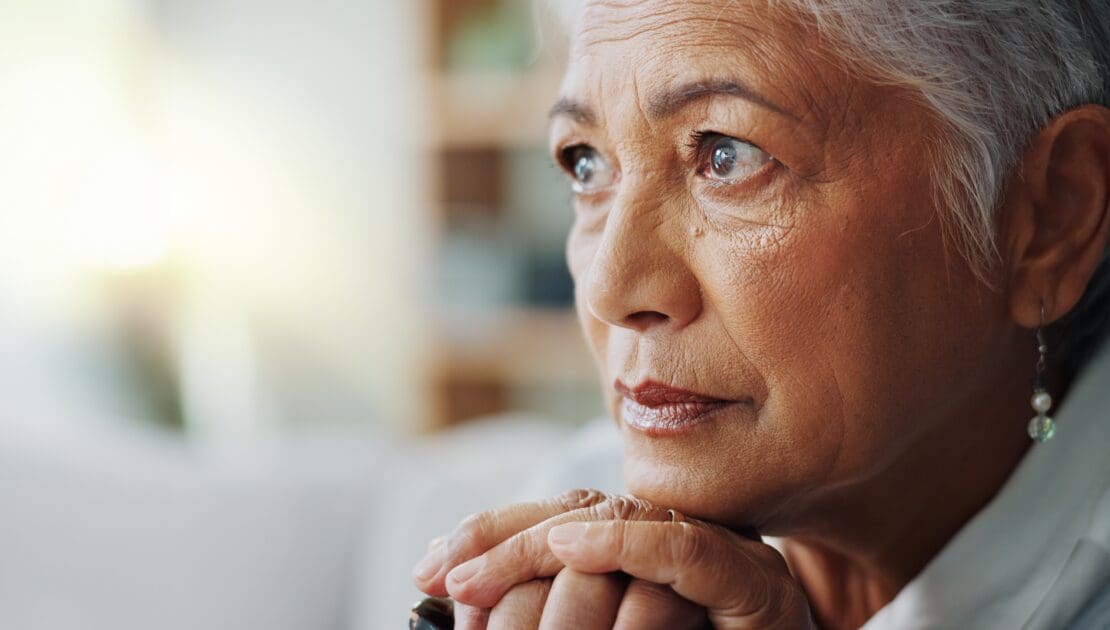At 78, Margaret had raised a family, survived breast cancer, and volunteered every Thursday at her church. But after her husband passed, she quietly stopped showing up.
Living a long life is a privilege that not everyone experiences. However, those who reach their senior years face unique mental health challenges. Whether we are focused on our own healthy aging or advocating for the older individuals we care about, understanding the mental health needs of seniors can enhance our relationships and ensure they receive meaningful care when necessary.
Mental health conditions affect around 14% of adults aged 60 and older, according to the World Health Organization. Yet these issues are often underrecognized and undertreated. Stigma, fear of being a burden and lack of access to care all contribute to older adults suffering in silence. Depression and anxiety are the most common mental health conditions in later life, and older adults account for more than a quarter of global suicide deaths (27.2%), a heartbreaking reminder that emotional distress in aging populations is both serious and under-addressed.
Risk factors like bereavement, reduced income, loss of purpose after retirement, social isolation and elder abuse, which affects 1 in 6 older adults, can all increase the risk of mental illness. These stressors often build on a lifetime of challenges, and ageism adds another layer of harm by sending the message that suffering is simply part of growing old.
Margaret’s story demonstrates how important it can be for supportive friends and relatives to be aware of senior citizens’ mental health and to help connect them with care. When church members contacted Margaret, they learned she had been feeling unwell recently but didn’t want to bother anyone by asking for help. She shared over the phone that she had been feeling more tired than usual and wasn’t interested in her regular activities, like cooking, gardening or attending church.
Luckily for Margaret, one of her fellow volunteers recently attended a community training on mental health and learned the signs of depression in older adults. Signs like Margaret’s withdrawal from social activities, her loss of interest in hobbies and her unexplained fatigue alerted her friend that she might need extra support.
Other signs that an older person may be experiencing mental illness could include:
- Increased worry, irritability or restlessness
- Neglecting hygiene or home care
- Saying things like “What’s the point?” or giving away belongings
- Fixation on death or refusing help for unclear reasons
These can be triggered or intensified by age-related life changes, but they are still valid mental health concerns, not something to “just accept” as a normal part of getting older.
For example, grief associated with losing a spouse or other loved one can be difficult to cope with. Seniors may experience changes in mobility, independence or living situations, such as moving to assisted living. Some folks feel like they are losing control of their lives. They may struggle with feeling like a burden for needing added support after a lifetime of providing care to others.
Loneliness and isolation, especially after retirement or the loss of social roles, can contribute to mental health challenges, as well as very real fears around falling, illness or financial insecurity.
Nearly one in four adults aged 65 and older in the U.S. live in social isolation, as reported by the National Academies of Sciences, Engineering, and Medicine. A U.S. Surgeon General’s report finds that chronic loneliness not only affects mood, it raises the risk of premature death by nearly 30%, a threat on par with smoking and obesity, and is linked to heart disease, stroke, dementia, depression, anxiety and suicide.
Seniors may also experience mental health issues that are not associated with age. Major depression, anxiety disorders, substance use disorders and other mental illnesses can affect people at any life stage.
At first, Margaret seemed reluctant to talk about her feelings with her friend over the phone. She also felt uneasy about inviting her friend to visit because she was embarrassed by how much she’d let things go. Margaret’s friend didn’t push. She offered an alternative.
Instead, she asked if she could drop off some homemade soup and wave from the porch. “There’s no need to clean up or let me in,” she said gently. I just want you to know you’re not alone.”
Later that week, Margaret let her friend inside.
They sat together at the kitchen table and discussed how life had changed. Margaret’s friend shared that she, too, had struggled after losing a spouse and that talking to a counselor had helped her find her footing again.
That simple conversation became the bridge to something bigger. Margaret’s friend offered to help her call her trusted primary care provider, who connected her with a behavioral health counselor trained to work with older adults.
It wasn’t an overnight transformation, but it was a beginning.
Aging comes with change, but mental and emotional suffering are not inevitable. Whether it’s grief, loneliness or a more serious mental health condition, treatment and support can help older folks navigate challenges and improve the quality of their lives.
As Margaret’s story reminds us, healing is possible at any life stage, but no one should have to go it alone. Whether you’re aging yourself or want to show up for the elders in your life, know this: mental health matters at every age. And every act of care can help someone reconnect with their own light, no matter how small.
If you or a loved one is struggling, start by speaking with a trusted healthcare provider. Many communities also offer support through senior centers, behavioral health clinics or grief groups. Our clinicians and care teams are trained to support people at every stage of life, including aging adults and caregivers.
We all deserve to be seen, heard and cared for, no matter how many candles are on the cake.
Often, all it takes is one moment of connection to light the way forward.

